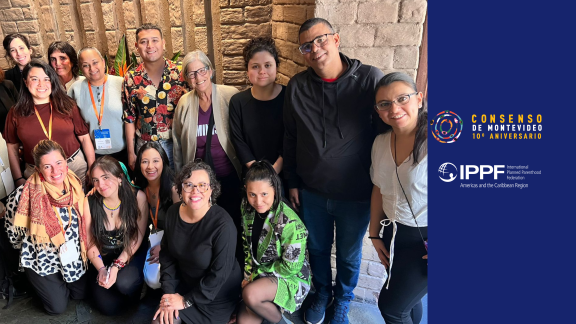In commemoration of the tenth anniversary of the Montevideo Consensus, representatives of civil society and governments from across Latin America and the Caribbean gathered on November 14-15 in Santiago, Chile, to commemorate the adoption of the Montevideo Consensus, strengthen our ties and articulate regional resistance against any attempt to roll back human rights, reaffirming our commitment to a future where human rights are unwavering pillars of our society, with an increase rather than a decrease in their scope.
Today, the region faces an imperative challenge: to preserve fundamental human rights gains in a context where fundamentalisms are gaining ground and the extreme right is gaining strength. It is crucial that both individuals and society as a whole unite to protect the freedoms and rights of all people, keeping alive the historical memory of the struggles for their implementation and protection.
Gender equality, sexual diversity, poverty eradication, access to health and sex education, among other fundamental aspects, must not be compromised by extremist ideologies that threaten peace and social justice.
During this meeting, the proposed second regional report on the implementation of the Montevideo Consensus on Population and Development was presented by the Technical Secretariat, and governments shared their voluntary national reports on the implementation of the signed commitments. In this crucial context, IPPF Americas and the Caribbean and its member organizations were present to demand the comprehensive guarantee of the human rights of all people, especially those groups in vulnerable situations in our region, marked by inequalities.
IPPF urged the governments of the countries in Latin America and the Caribbean to ensure sufficient resources to carry out the priority measures framed in the Montevideo Consensus, specifically those related to sexual and reproductive health and rights, in order to guarantee the well-being and full exercise of the human rights of women, children, adolescents and youth in the region.
The statistics are alarming: in Latin America and the Caribbean, 32.1% of the total population lives in poverty and 13.1% in extreme poverty (according to ECLAC data, 2022). In 2023, the poorest 50% of the population will receive only 10% of income, while the richest 10% will receive 55%. In terms of wealth, the concentration is even greater: the richest 10% accumulate 77% of wealth, while the poorest 50% account for barely 1% (Development Bank of Latin America and the Caribbean, 2022).
These figures underscore the urgency of our work and urge us to redouble our efforts to protect and expand human rights in the region, while eradicating all forms of discrimination and social inequality.In relation to health services, IPPF has demonstrated that it is possible and effective to implement services that take into account the specific needs of men, women, adolescents, people from the LGTBQ+ community, people living with HIV, people with disabilities, indigenous people and any other vulnerable group. The signatory governments of the Montevideo Consensus must eliminate any type of discrimination in services and guarantee that they are accessible to the entire population.
Three areas demand our immediate attention: forced and early marriages, the active participation of young people, and guaranteed access to sex education for all people, allowing them to access the services they need. According to UNICEF, in Latin America and the Caribbean, one in five girls marries before the age of 18 and most become pregnant before the age of 20. This figure, which is worrying because it has remained constant for more than 25 years, underscores that our efforts as a society are not enough.
Regarding the sexual rights of sex workers, IPPF and allies presented the new Alliance for the Human Rights and Inclusion of Sex Workers in Latin America and the Caribbean in Chile, where we recall the obligation of States to commit to the comprehensive fulfillment of the human rights of this population and the eradication of all criminalization and political or social persecution they face. The Alliance also called for the design and strengthening of public policies related to sex workers and their development that recognize that "sex workers must live free from any stigma and discrimination".
It is imperative to strengthen our collaboration and commitment to the principles of the Montevideo Consensus as a region, understanding that only through unity and joint action can we protect the fundamental rights of all inhabitants of Latin America and the Caribbean, ensuring a future where equality and justice are the norm, not the exception.
Eugenia Lopez Uribe
Regional Director IPPF ACRO

Subelaradio
Entrevista Eugenia López en Programa Café con Nata https://twitter.com/subelaradio/status/1724410296100356560?s=20
https://open.spotify.com/episode/2AdtklbMbkzoHoqGCO1TOG?si=qngUzxMeSmCqtIgC9Zq1zg&t=2019
Pressenza
El Soberano.org
La tercera
Observador Mundial
https://youtu.be/xFbDFAuA-q8?si=Qflq3v9ZdqXIalc5

when
region
Americas & the Caribbean









